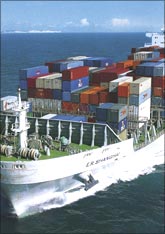The country's first trans-shipment port will be opened at Vallarpadam in Kochi soon. As its developer Dubai Port World, gets ready for the launch on February 11, managing director (subcontinent) Anil Singh talks about the expectation and hurdles that lie ahead for the terminal.
Today, 45 per cent of India's trade is trans-shipped over other regional ports such as Colombo, even as India's container cargo is growing by 15 per cent every year. The development of a trans-shipment hub within the country would definitely help India's trade and accelerate its growth.
We are moving the Rajiv Gandhi Terminal to Vallarpadam, which we couldn't do it earlier since the required draft was not available.
By the end of the first operational financial year we expect to handle 850,000 TEUs (one container of 20 foot equivalent units).
Will Colombo face competition from Vallarpadam?
Colombo handles four million TEUs. In the first year we would take 600 TEUs to bring us to our capacity. Currently, India's cargo gets trans-shipped out of Colombo and Jebel Ali and Salalah.
Emergence of these trans-shipment hubs, additional handling and ultimately higher costs of transportation made Indian goods less competitive overseas when compared to China, Vietnam and South East Asian countries.
What is the biggest challenge for Vallarpadam?
Dredging and draft are the main challenges. There is a need for continuous maintenance of the channel. Also, we are still awaiting the cabotage approval.
Without cabotage relaxation we will have fewer customers and the port cannot be a success. We hope we get that soon.
What is the draft situation at present?
The Kochi Port Trust has provided us with draft across 350 meters with a depth of 13 meters. By March, the Port Trust has said, the draft will be 14.5 metres. The dredging will continue since of the total 605 metres only 350 has been dredged so far.
Will the shipping cost for exporters come down?
Exporters will get cheaper rates. They can save up to Rs 700 crore (Rs 7 billion) a year by not having trans-shipment outside India.
Overall the terminal will add a capacity of 1 million TEUs to 10 million TEUs container capacity of the country. We lose trade of Rs 1,000 crore (Rs 10 billion) every year because of this.
It has increased our logistics cost. A trans-shipment hub is essential for an Exim port. We will market the port globally.